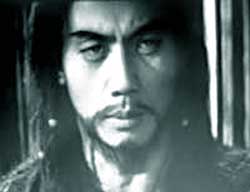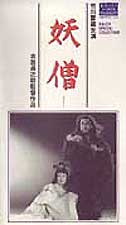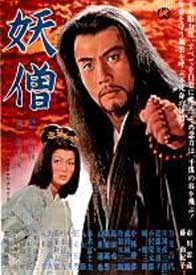Yoso is truly a lost classic, set in the Nara Era (710-794), from Kinugasa Teinosuke the same writer/director who gave us the recognized classic Gate of Hell (Jigokumon, 1952) & the milestone silent surrealist masterpiece A Page of Madness (Kurutta Ippeji, 1926).
 It has a screenplay by Fuji Yahiro who also wrote Kenji Mizoguchi's Sansho the Bailiff (Sansho daiyo, 1954), & a musical score by frequently brilliant Akira Ifukube. The stunning cinematography is that of Hiroshi Imai, who also helped create the gloomy beauty of the Shinobi no mono series likewise starring Raizo Ichikawa. It has a screenplay by Fuji Yahiro who also wrote Kenji Mizoguchi's Sansho the Bailiff (Sansho daiyo, 1954), & a musical score by frequently brilliant Akira Ifukube. The stunning cinematography is that of Hiroshi Imai, who also helped create the gloomy beauty of the Shinobi no mono series likewise starring Raizo Ichikawa.
Yoso means "esoteric priest" which implies "sorcerer." For such a rarely screened film, it seems to have attracted an unwieldy number of English titles: The Sorcerer, Ghostly Priest, Bronze Magician, Phantom Priest, & on the subtitled 35 mm print the only fully apropos title, Priest & Empress, not to be confused with another Raizo Ichikawa film called The Priest & the Beauty (Anchin to Kyohima, 1960).
Mistakenly, on the basis its sundry titles, it has found its way onto filmographies of Japanese horror & fantasy. But it is decidedly a historical tale, & only "horror" is the same way that the true tale of the monk Rasputin & his influence on the Empress of Russia is surrounded by an aura of horror.
It's an example of the most artful categories of samurai films, zankoku jidai-geki or "cruel historicals." Raizo appears in other examples of the sub-genre, notably Betrayal (Daisatsujin orochi, 1966), & The Third Shadow (Daisan no Kagemusha, 1963), & Scar Yosaburo (Kirare Yosaburo, 1960). It's a close call which is the best of the lot, but Yoso is way up there among the best of the best of Raizo Ichikawa.
 Japan of the Nara Era had a sovereign female emperor or Mikado, Koken-Shotoku Tenno, who fell under the sway of a Buddhist priest named Dokyo. His influence over her proved so untoward that Empress Koken-Shotoku gave him titles which implied the imperial line might actually pass to him should the Empress die, despite that the imperial line had been preserved as a single dynasty back into prehistory.
Japan of the Nara Era had a sovereign female emperor or Mikado, Koken-Shotoku Tenno, who fell under the sway of a Buddhist priest named Dokyo. His influence over her proved so untoward that Empress Koken-Shotoku gave him titles which implied the imperial line might actually pass to him should the Empress die, despite that the imperial line had been preserved as a single dynasty back into prehistory.
The crisis engendered by Dokyu led to the banning of women ever again becoming Mikado, a decision periodically revisited including in our own generation when there stood a strong threat of no authentic male heir.
The film takes this historical reality & makes of it a believable though tough & very odd love story. Dokyo, who has indeed been called "the Japanese Rasputin," as played by Raizo Ichikawa, is just about the most beautiful creature imaginable. Indeed, when I first saw this film in my youth, I had heart palpitations for Raizo despite that my primary relationships had always been with women. In his dark priestly robe, with his long straight hair & beard, his intense flashing eyes, how any woman gay or straight could evade the influence of his glance is impossible to imagine.
Myself & my parter at the time, after seeing this film, shared certain bedroom fantasies of a threesome between us & Raizo Ichikawa. And soonafter, the most amazing encounter happened. We were at an art opening for a Japanese artist & we spotted a young man with long hair & beard who not only looked an awful lot like Raizo Ichikawa, but specifically like Raizo in the role of Dokyo.
We immediately began elbowing each other & giggling, "Look! It's Raizo!" Then we kind of made fools of ourselves as we followed the fellow around the party until he realized we were attracted to him. Since we were young & pretty dykes, he was easily flattered. In fact our interest got him rather full of himself, so that he led us round & round a pillar in the room, obviously amused that we were behaving like lovestruck stalkers.
He soon approached us, & for all his beauty he was also something of an eccentric weirdo with nurdy interests identical to our own, so we were just awfully compatible, not least because it turned out he was a chambara fan like us. As a child he had gone weekly to the Kokusai cinema with his mother, & had a minor fetish for women who did swordfighting & general martial arts, so we were in like flint. Having been weaned on samurai films, he already well knew that with his lean alien beauty he rather resembled Raizo.
After that, we'd all get together to head off to Toyo & Kokusai cinemas together, & that friendship has lasted the decades since, thanks in great part to the sexiness of Raizo Ichikawa as Dokyo.
So -- the main characters of the film are the Buddhist priest Dokyo, & Koken-Shotoku Tenno (749-70) played by the ethereally beautiful Miyako Endo. Support cast includes Hikosaburo Kataoka, Eitaro Ozawa, Tomisaburo Wakayama (credited as Kenzaburo Jo), Tokio Oki, Mieko Kondo, Hikozaburo Kataoka, & Yukiko Fuji.
Empress Koken-Shotoku is played as sickly, bedridden & needy, which was not historically accurate, but it sets up a good excuse to have the priest at her bedside, which leads to their angst-ridden taboo romance.
Though Dokyo clearly uses the affections of the Empress for personal gain & power, his intense devotion to Shotoku is nevertheless no falsehood. When it comes time for his assassination, it is very much Rasputin-like, as he is damnably difficult to kill. It's portrayed quite horrifically but it remains simultaneously sorrowful because his love of Shotoku was no pose.
A lot of the strength of the film is in its pictorial excellence. Its moody dismalness & the passionate almost operatic acting style blends the best of kabuki manneredness with neo-realism. The entire film seems to take place in a dream of beauty & terror, misery & ecstacy.
copyright © by Paghat the Ratgirl
|

 It has a screenplay by Fuji Yahiro who also wrote Kenji Mizoguchi's Sansho the Bailiff (Sansho daiyo, 1954), & a musical score by frequently brilliant Akira Ifukube. The stunning cinematography is that of Hiroshi Imai, who also helped create the gloomy beauty of the
It has a screenplay by Fuji Yahiro who also wrote Kenji Mizoguchi's Sansho the Bailiff (Sansho daiyo, 1954), & a musical score by frequently brilliant Akira Ifukube. The stunning cinematography is that of Hiroshi Imai, who also helped create the gloomy beauty of the 